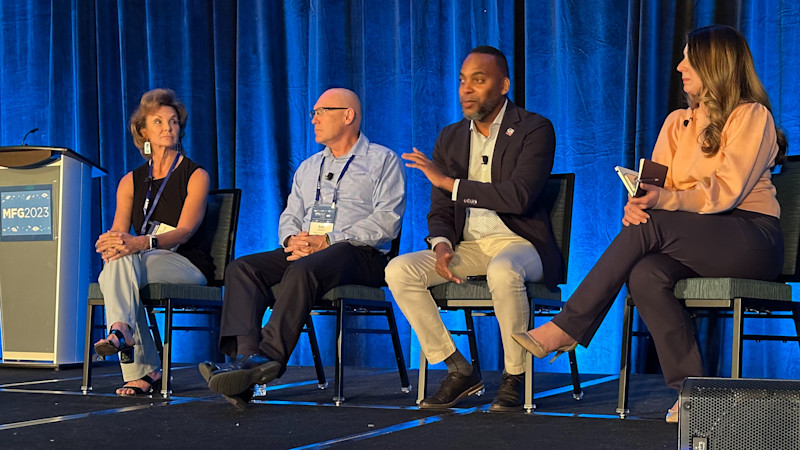This year, The MFG Meeting 2023 hosted nearly 400 business leaders to share industry insights, among them tactics to close the skills gap. Here are three top take-aways from the workforce discussion panel, “Considerations and Models to Scope and Scale Pipeline Sector Strategies.”
1. Reduce cost and time barriers to expand and diversify the talent base.
Ken Hackler, Automated Industrial Technology program director and residential faculty at Mesa Community College, detailed the Semiconductor Technician Quick Start program launched cooperatively by three Maricopa Community Colleges.
The program was intentionally designed to increase enrollment from diverse populations who have work, income, and childcare constraints. Tuition is paid upon successful completion, and the course is only 10 days for college credit as a hybrid to allow people to still work in their jobs while attending the course. Industry certifications are awarded to participants as portable validation to continue their career journeys. The program has a robust pipeline serving more than 600 aerospace and semiconductor technicians.
2. Education-industry partnerships develop skills that matter the most.
The co-developers of the Semiconductor Technician Quick Start program worked closely with semiconductor employers to collectively design the curriculum to specifically outline the knowledge, skills, and abilities that were needed most urgently at the entry technician level and to quickly get people into the workforce pipeline.
“We sat down with companies to map out the programs together, understanding the competencies needed, and designing the learning pathway so that later they can eventually obtain a degree,” says Leah Palmer, executive director of Arizona Advanced Manufacturing Institute at Maricopa Community Colleges Workforce. “Not only did we learn about their business needs, but we also helped them rewrite their job descriptions so they’re asking for the skills they really needed.”
3. To retain talent, employers need a modernized, long-term continuous approach to on-the-job training.
By looking a few steps ahead on the professional development journey, employers can grab the baton from educators with Smart Training Solutions. This helps keep employees engaged and fulfilled and helps the company retain their workforce.
“To upskill their workers with on-the-job training, companies need performance standards, tasks well-aligned to workplace activities, trainer instructions, and real data to assess performance of all stakeholders,” says Montez King, executive director of NIMS - National Institute for Metalworking Skills. “Companies should not assume they know how to train on the job. A decision to train is not a solution without know-how.”
Learn from manufacturing industry experts in education, economics, and technology by attending AMT’s MFG Meeting 2024, to be held April 24-26, in Orlando, Florida.
Read these related stories on AMTonline.org






